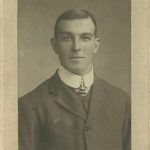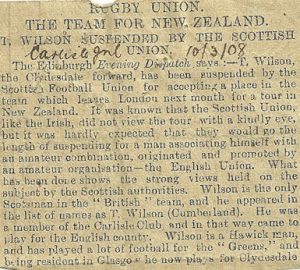Rugby Incident
Sally Wilson

Thomas was a keen sportsman as were many of his contemporaries. Three of his Greive cousins played cricket for Scotland. William played for the national team against Ireland in 1910; Walter made two appearances for Scotland between 1912 and 1914; and John played for Scotland several times and, in 1920, he set up a record in Border cricket by scoring 1,011 runs, including three of his 30 centuries.
Thomas’s game of choice was rugby, a game that he also played at the national level. He played amateur rugby for several rugby clubs including Clydesdale (in Glasgow), Hawick and Carlisle, England. When, in late 1907, an Anglo-Welsh team was proposed to travel to New Zealand for a tour in May of 1908, his interest was piqued. Although Scottish by birth, Wilson had played for Carlisle’s rugby team for several years while he was employed as a civil engineer in that town. This made him eligible to play for the English team destined for New Zealand.
In late 1907 he accepted an engineering position in Glasgow and joined the Clydesdale team. This put him in a difficult position with regard to the proposed tour of New Zealand. The Scottish Union did not support colonial tours as they believed that they negatively impacted the amateur status of the players. With tours of this nature, teams were in a position to profit from the games’ ticket sales. The Scottish union had hosted games with touring New Zealand and South African teams in the past, but while the NZ and SA teams had profited from the games, the Scottish teams had not. The Scottish Union was in a position to maintain its amateur status while the games were played on Scottish soil, something that was harder to do overseas.
Wilson wrote to the Scottish Union in December 1907 to inquire about playing on the Anglo-English touring team. In a second letter on December 23 he wrote:
“I was under the impression that the Scottish Union were in favour of the proposed New Zealand tour, and my letter of the 19th inst. was merely an intimation that I had sent in my name to the secretary. I shall certainly not go to New Zealand without permission from the union, and I shall be glad to know whether I have their sanction to accept an invitation or not.” 1..
In reply the secretary of the Scottish Union, Mr. Smith, wrote:
“I have to thank you for yours of yesterday, which makes matters quite clear. I may say at once that the committee will not grant permission to any of their players to go with the proposed team to New Zealand and in that connection the past paragraph of your letter is very satisfactory indeed” 2.
Subsequently Thomas resigned from the Clydesdale club in order to play with Carlisle. When the list of the names of the players going on the New Zealand tour was published, T. Wilson was included on the list. The inclusion of his name on this list led to his suspension from the Scottish Football Union.
Although there is no law in sports indicating that one union must honour the other’s suspensions, the unions generally acknowledged them. Consequently the Emergency Committee of the English Union also provisionally suspended him. This action by the English Union was subsequently revoked as the suspension by the Scottish Union was not for rough play, misbehaviour or breach of professional law. This meant that Wilson could play for England but he would not be allowed to play football in Scotland in future unless the Scottish suspension was also dropped.
Although the English Union removed its suspension from Wilson, he did not make the tour of New Zealand.

